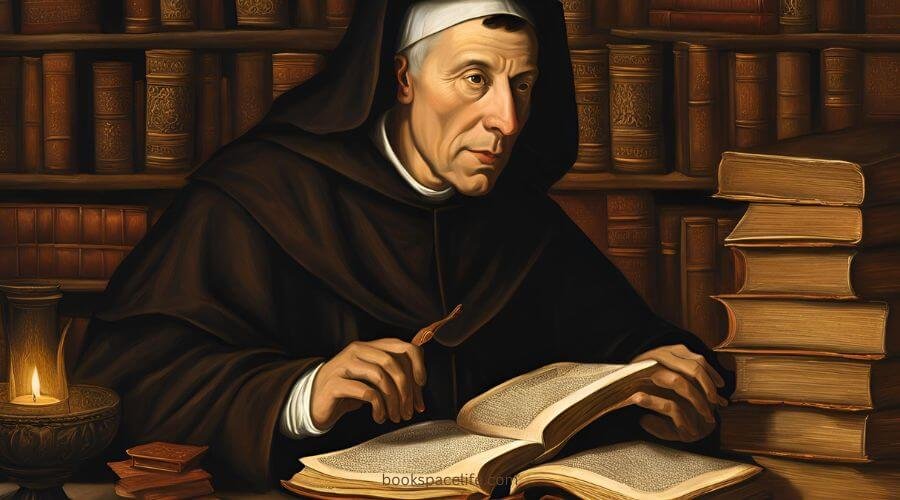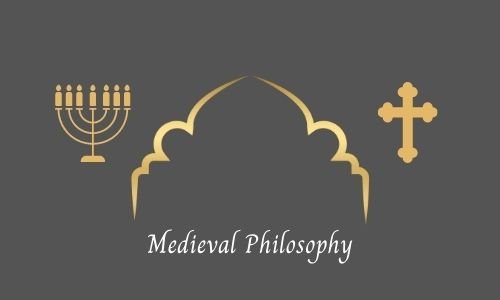John Duns Scotus
ohn Duns Scotus : The Subtle Doctor of Christian Philosophy
John Duns Scotus (1266-1308 CE), a Christian philosopher and theologian from Scotland, stands as one of the most influential and original thinkers of the High Middle Ages.
Known as the “Subtle Doctor” due to his complex and nuanced arguments, Scotus made pioneering contributions to metaphysics, epistemology, and theology.
John Duns Scotus’s innovative ideas on the nature of existence, the role of free will, and the concept of divine love significantly impacted Christian philosophy and continue to influence theological thought today.
Table of Contents
(1) Early Life and Education
John Duns Scotus was born in the small village of Duns in Berwickshire, Scotland, around 1266. The details of his early life remain scarce, but he is believed to have come from a relatively modest background.
Recognizing his intellectual gifts, his family encouraged him to join the Franciscan order at a young age.
He entered the Franciscan convent at Dumfries and later pursued higher studies, moving through a rigorous scholastic curriculum.
Scotus was sent to study at the University of Oxford, where he excelled in philosophy and theology under the Franciscan intellectual tradition.
At Oxford, he encountered the works of major Christian thinkers, including Augustine and Anselm, as well as Aristotle’s teachings, which had been reintroduced to Europe through Islamic scholars.
Aristotle’s work, which emphasized reason and empirical observation, presented a new challenge to Christian philosophy, and it was this engagement with classical philosophy that helped shape Scotus’s intellectual development.
In the early 1300s, Scotus traveled to Paris to continue his studies at the University of Paris, the intellectual heart of Christendom.
Paris at this time was a vibrant center for philosophical and theological debate, attracting the best minds of Europe.
Here, Scotus encountered the influential thought of Thomas Aquinas and developed his own ideas, eventually earning his Master of Theology degree and gaining a reputation as an incisive thinker.
Scotus also briefly taught at the University of Cologne, where he would complete some of his most influential works before his death in 1308.
(2) Philosophy and Key Contributions
John Duns Scotus’s intellectual legacy lies in his meticulous approach to questions about God, free will, and the nature of reality.
His philosophical inquiries delved into complex questions of metaphysics, ethics, and theology, often challenging established views with bold new perspectives.
(i) The Univocity of Being
One of Scotus’s major contributions to metaphysics is his concept of the univocity of being. In traditional metaphysical thought, there was a sharp distinction between God and creation, with being understood as something qualitatively different when applied to God versus created things.
Scotus argued that the concept of “being” applies univocally, or with the same meaning, to both God and creatures, even though God and creatures differ in the degree or mode of their being.
Scotus’s univocity of being enabled him to argue that human beings could attain true knowledge of God’s existence through reason and observation.
By establishing this commonality, Scotus provided a way to bridge human understanding and divine reality without compromising the transcendence of God.
(ii) The Formal Distinction
Another significant contribution was Scotus’s notion of the formal distinction, which he proposed as a way to understand the relationships between different aspects of reality without reducing them to mere human constructs or nominal distinctions.
According to Scotus, a formal distinction exists between two attributes or aspects that are separable in thought but not in reality.
This concept enabled him to explain, for example, the relationship between God’s attributes of justice and mercy or between the mind and soul in humans.
Scotus’s formal distinction offered a refined way of thinking about complex relationships that respected both unity and diversity within a single being.
This idea has influenced discussions in theology and metaphysics for centuries, helping later thinkers navigate questions about the nature of God and human nature.
(iii) The Primacy of the Will and Free Will
Unlike Thomas Aquinas, who emphasized the primacy of the intellect, Scotus argued that the will has primacy over the intellect.
This view, known as voluntarism, suggests that the human will, more than human reason, defines moral goodness and leads the soul toward God.
Scotus saw the will as fundamentally free, capable of choosing between good and evil.
Scotus’s view of the will influenced later thinkers in their exploration of ethics and freedom, presenting a powerful argument for the role of individual agency and responsibility in moral decision-making.
His work on free will also laid the groundwork for subsequent discussions on the compatibility of divine omniscience and human freedom.
(iv) The Doctrine of the Immaculate Conception
One of Scotus’s most famous theological positions was his defense of the doctrine of the Immaculate Conception of Mary, which stated that Mary was preserved from original sin from the moment of her conception.
This doctrine was controversial at the time, as many theologians believed that such an idea compromised the universality of Christ’s redemptive work.
Scotus argued that God, in His omnipotence and grace, could foreknow and preserve Mary from original sin in anticipation of Christ’s merits.
His defense of this doctrine was instrumental in its eventual acceptance within the Catholic Church, which formally recognized it as dogma in 1854.
Scotus’s argument demonstrated his theological creativity and his willingness to engage with complex issues of doctrine in ways that deepened and enriched Christian teachings.
(v) Influence on Scholasticism and Beyond
John Duns Scotus’s contributions greatly impacted the Scholastic tradition, influencing subsequent generations of thinkers, including William of Ockham, who studied and critiqued Scotus’s ideas on universals and the nature of being.
Scotus’s meticulous, often intricate approach to philosophical and theological issues earned him the title of “Subtle Doctor,” as he was known for the depth and detail of his reasoning.
In many ways, Scotus laid the groundwork for modern philosophical inquiry by exploring the boundaries between faith and reason.
His work bridged the gap between theology and philosophy, encouraging later thinkers to explore religious belief and ethical questions through a framework of rational analysis and metaphysical rigor.
Scotus’s ideas also influenced the Franciscan intellectual tradition, setting the stage for later developments in Catholic thought.
(vi) Reformation and Modern Philosophy
Scotus’s emphasis on the primacy of the will and his defense of the univocity of being had a profound influence on Protestant thinkers during the Reformation.
Figures such as Martin Luther drew upon Scotus’s voluntarism, seeing in it a foundation for the doctrine of salvation by grace and a rejection of purely intellectual approaches to theology.
In the realm of modern philosophy, Scotus’s ideas have influenced phenomenology, existentialism, and contemporary metaphysics.
His notion of formal distinction, for example, prefigured ideas later developed by phenomenologists like Edmund Husserl.
Likewise, his exploration of individual will and moral autonomy has resonated with existentialist thinkers such as Jean-Paul Sartre, who valued the concept of radical freedom in human action.
(3) Legacy and Enduring Impact
John Duns Scotus’s legacy endures as a testament to intellectual bravery and the relentless pursuit of truth.
He was canonized in 1993 by Pope John Paul II, who praised him as a “defender of the Immaculate Conception and a fearless proponent of the rationality of Christian faith.” Scotus’s philosophy embodies a unique blend of analytical rigor and theological devotion, with his thought remaining relevant in both philosophical and religious contexts.
Scotus’s insights on free will, the univocity of being, and the primacy of the will continue to inspire discussions on human freedom, divine justice, and the nature of existence.
His ideas remain central in Catholic philosophical education, and his influence extends to Protestant and secular thinkers exploring the interplay of faith and reason.
(4) Conclusion: The Relevance of the Subtle Doctor
The life and thought of John Duns Scotus remind us of the power of philosophy to deepen our understanding of faith, morality, and existence itself.
His works challenge believers and thinkers to approach their own beliefs with intellectual humility and openness, embracing the complex mysteries of the divine and human nature.
Scotus’s philosophy, marked by subtlety and rigor, remains relevant today, inspiring those who seek to explore the boundaries between reason and revelation, knowledge and faith.
John Duns Scotus’s commitment to exploring faith through reason and his contributions to philosophy and theology leave a lasting legacy that continues to influence those who seek wisdom and understanding in the complexities of life and belief.








